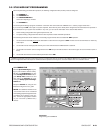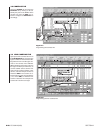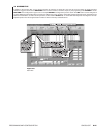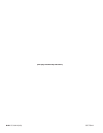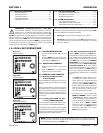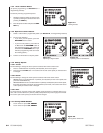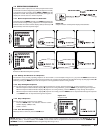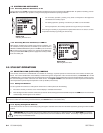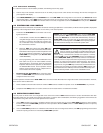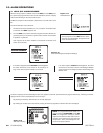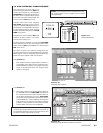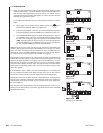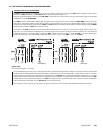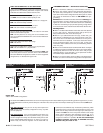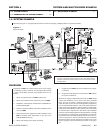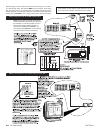
OPERATION CM9760-SAT 3-5
2.1.3 Link Camera Availability
If a called link camera is not immediately available, the following reasons may apply:
a. A tie line may not be available. If all tie lines are in use when you try to access a link camera, the message “No Tie Lines” will appear on
your keyboard LCD display.
b. If the LOCAL/REMOTE option in the ACCESS menu on the SAT SIDE of the configuration is set to LOCAL (see Section 2,
Access
Programming Menu
), and an SAT operator is using the camera you are trying to call, you will not be able to grab control of that camera
until 5 seconds after the local SAT user releases control. Of course, the opposite is true if the ACCESS menu entry is set to REMOTE.
2.2 CONTROLLING LINK CAMERAS
Fixed cameras can be viewed, but not controlled. Of camera-receiver types (RS-422 “P” and Coaxitron) for which control is possible, the physical
geometry of the configuration chosen (based on user choice), is the most important.
• Control from the 9760 SIDE when all monitor-outs are con-
figured as tie lines
1. In this situation, receiver control for SAT video inputs
using RS-422 type controls is possible only if the con-
trol wiring is run back to the head-end. Coaxitron con-
trol, on the other hand, is exercised through the video
link, which exist as tie lines.
2. Moreover, SAT menu options that affect SAT video
input connections as well as those that affect the 9760-
SAT interface with respect to control and operation must
still be programmed. Programming is done from the
9760 SIDE of the configuration (see Section Two,
PRELIMINARIES
).
3. Once programming and control considerations have
been taken care of you can select satellite cameras
(discussed above) and perform almost all other 9760
keyboard related camera operations as described in
the CM9760-KBD manual. These operations include
patterns, zones, presets, and so on, subject to the nor-
mal constraints of receiver capability.
• Control from the 9760 SIDE when concurrent control
exists on the SAT SIDE and a mixture of local and tie line-
configured monitor-outs exists.
Control operations viewed from the 9760 SIDE under concurrent control differs little from single-side control as discussed above. However,
there are two obvious differences:
1. Fewer available tie lines limit the maximum number of SAT cameras available for operator use on the 9760 SIDE at any one time.
2. Competition with SAT operators for camera control and an increased chance of inadvertent anomalies.
2.3 OPERATING SUGGESTIONS
You may have no choice in the use of single-side versus concurrent control of SAT functions because of on-site considerations other than
those discussed here. Yet, based on the foregoing discussions, as well as other considerations, the following suggestions and comments are
offered when using either of the two control options we have outlined:
1. If local SAT operation and control is enabled or desired, then we suggest that you use the 9760 SIDE primarily for alarm reporting
functions and minimize 9760 SIDE generation of control operations directed at SAT cameras. Let SAT SIDE operators have primary
control of SAT cameras.
2. If no local SAT SIDE operations are entertained and all monitor-outs are configured as tie lines, then SAT programming and all control
and alarm reporting functions are controlled by 9760 SIDE operators.
IMPORTANT:
The following control problem might occur
when an operator is controlling a satellite CAM under PTZ
control on a local system (9760) monitor. Care must be taken
before issuing a command that overrides and replaces a currently
controlled
SAT
camera with a
NON-SAT
camera via a MACRO type
COPY (
COM,
COC
,
CCO
step commands) command. The CM9760-
SAT may not issue a stop command to the previously controlled PTZ
camera, as it does not know that the switch took place. The result is
that the PTZ camera will continue to move. A possible work around
might involve using the
?SW
step command to avoid inadvertent use
of COPY type commands for monitors displaying
SAT
cameras. For
information about the ?SW step command, see the
“Macro Step Com-
mands and Setup Details”
section in the 9760-MGR manual.
NOTE:
Total, head-end,
9760-SIDE
control, eliminates
SAT SIDE
control operations.
SAT
control is discussed in detail in the previous
section (see
Section 3
,
1.0 LOCAL SAT OPERATIONS
)
.
Control, for
9760 SIDE
users, is an issue only to the extent that it lessens or
increases the useful integration of the
SAT’s
alarm reporting capabili-
ties with those that already exist in the 9760 system itself.



